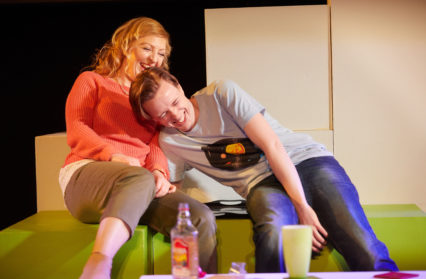Jafar Iqbal reviews Estron from Theatr Genedlaethol Cymru, a play about loss and grief with surprising moments of levity.
Loss seems to be a prevailing link in Theatr Genedlaethol Cymru’s recent work. After exploring dementia in Y Tad, the company now turns its attention to grief, specifically that of losing a parent. Estron follows Alun, a young man trying to recover from the untimely loss of his mother. With only his sister offering moral support, Alun retreats deeper into himself with a film script he can’t write and a mysterious Quality Street box.
While Y Tad was lauded for its unflinching tone, it’s the levity that stands out in Hefin Robinson’s one-act play. In between commiserating about their Mam, Alun and sister Han discuss where to buy bread and the joys of IKEA furniture. It’s the mundanity of human life that we all shelter ourselves in at difficult times, something Robinson smartly taps into. The play takes an inevitably darker turn in the final third, but it’s the science fiction element of the story that is most surprising.
It’s all very believable, however, and that is in large part due to Gareth Elis’ lead performance. He’s an instantly likable presence on stage, his boyish charm and dry humour hiding a pathos that slowly unravels. The best scenes are those he shares with Ceri Elen. She matches, if not surpasses, Elis when it comes to the comedy sequences, but it’s a monologue to the audience towards the end of the play where she truly shines. It’s one of a few instances where the fourth wall is broken, but the only time that it really works. Audience interaction earlier in the play feels forced and unnecessary, as though shoe-horned in to fill time.
It’s a misstep from Robinson and director Janet Aethwy, but Aethwy does a solid job overall. There’s a lot of symbolism in her approach to the aesthetics of the piece, particularly Heledd Rees’ set design. The make-up of the set changes with Alun’s demeanour: from monotonous white to unpredictable colour. Where Aethwy really excels is in her use of video projection. Much of the conversations take place via Skype, with Elis live on stage talking and responding to pre-recorded video footage of Elen. Those sequences work perfectly, and that is down to the ability of the actors and the director willing to take a risk.
Estron is a clear departure from Theatr Genedlaethol’s recent larger-scale pieces, and its wonderful to see more new Welsh-language voices. Robinson demonstrates his ability to create convincing characters, but not every decision hits the mark. That this young writer can write such an accomplished script yet still be finding his feet is a very exciting prospect for the future of Wales, and it’ll be interesting to see where he goes from here. While it may not be perfect, Estron is certainly an engaging and emotional piece of Welsh theatre.
(Image credit: Mark Douet)
You might also like…
Jafar Iqbal reviews Brad Birch’s Tremor, depicting two ex-lovers in a gladiatorial argument, which creates an emotionally charged performance.
Jafar Iqbal is a regular contributor to Wales Arts Review.












